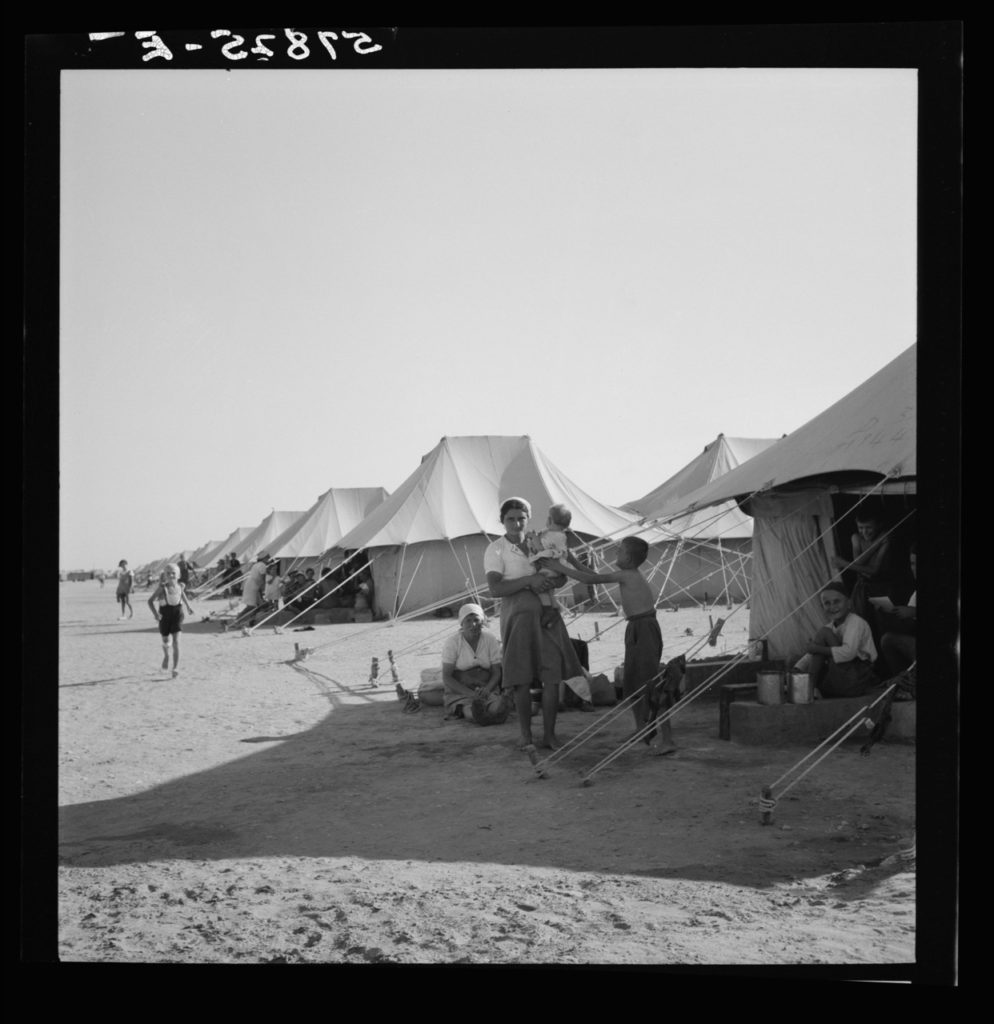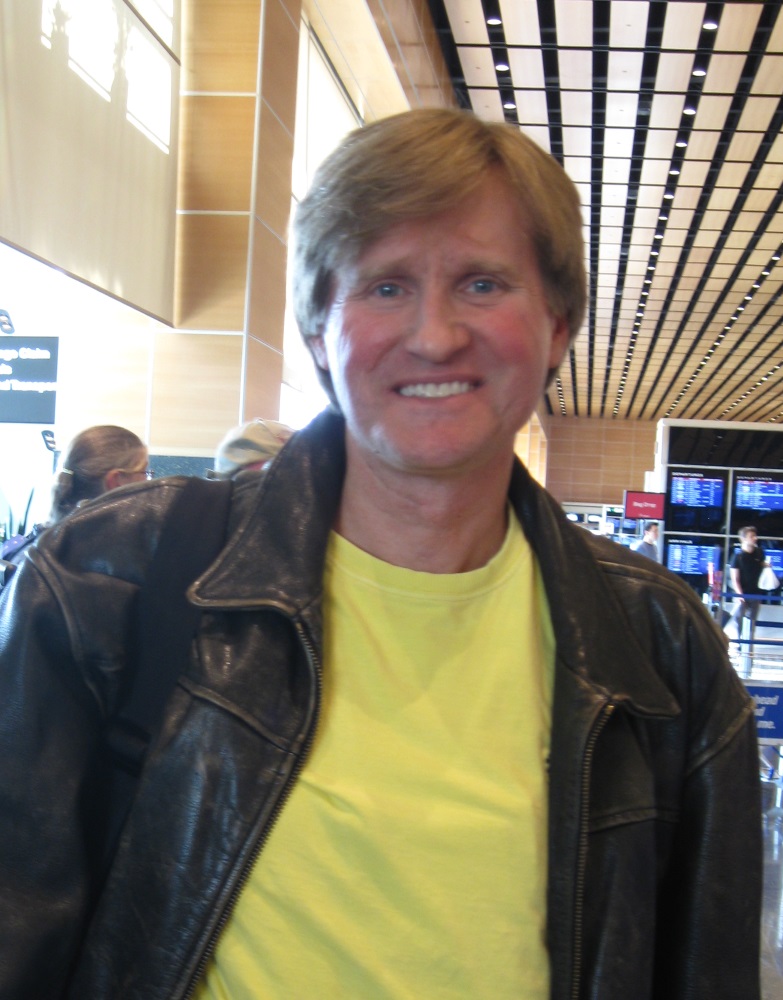You wouldn’t expect to find close connections between the Sinai desert, urban Serbia and the Appalachian mountains, but a new play by University of Massachusetts theater professor Milan Dragicevich brings them tellingly together. Refugee takes an episode from Dragicevich’s family history and follows its “generational aftershocks,” as the playwright puts it, into more recent history and the present day.
Displaced by World War II, Dragicevich’s mother fled with other evacuees from then-Yugoslavia to the El Shatt refugee camp on the Sinai Peninsula in Egypt. “The story is inspired by my mom’s seven-year sojourn as a displaced person,” he told me before the show opened. “But we mix it with other elements to create a wider story, leaping forward 50 years in time and space.” The play begins in the refugee camp, focusing on two Serbian sisters, Mara and Sava. Then, in alternating scenes, it spreads out across continents and oceans to include snapshots from the lives of two of the girls’ widely scattered descendants – one living in Belgrade during the NATO bombing of Serbia, the other in Eastern Kentucky.
 “I have always been interested in Southern Appalachia, a region that has managed to create and hold fast to its culture and identity in the face of tremendous and rapid change all around it,” Dragicevich said. “In a play that is exploring the impact of place in shaping identity, Appalachia is the first American frontier. It is a place that has seen waves of migration, displacement, refugees.” He recalled that after World War II, “more than two million hungry Appalachians fled those green mountains in search of work up north,” just as African Americans had migrated from the South a generation earlier.
“I have always been interested in Southern Appalachia, a region that has managed to create and hold fast to its culture and identity in the face of tremendous and rapid change all around it,” Dragicevich said. “In a play that is exploring the impact of place in shaping identity, Appalachia is the first American frontier. It is a place that has seen waves of migration, displacement, refugees.” He recalled that after World War II, “more than two million hungry Appalachians fled those green mountains in search of work up north,” just as African Americans had migrated from the South a generation earlier.
That experience, Dragicevich said, “is balanced against 1999 Belgrade, where displacement, exile and exodus were a daily fact of life. During the bleak decade of upheaval in the 1990s, more than 500,000 young people fled Milosevic’s Serbia. Every day people were faced with life-changing decisions concerning home and place, leaving home and traveling into the unknown world beyond the borders.
“When we change borders, what do we become?” the playwright mused. “I am very interested in how one person’s exodus influences the destiny of subsequent generations. Some things cannot really be known or understood without this long view. Our identity seems to be a grab-bag of many elements, some in our DNA, some in things we acquire along the yellow brick road. It’s a fascinating inquiry.”
For its premiere production, at UMass, that inquiry was abetted by two guest artists – the acclaimed Serbian director Nikita Milivojević, who himself has endured and made theater during periods of displacement and exodus; and the Oscar- and Grammy-nominated composer/musician/ethnomusicologist Tim Erikson.
Both artists have brought the script to life in ingenious and often thrilling ways. Milivojević has fashioned an impressive ensemble from his mostly student cast, and fashioned a set within the black-box Curtain Theater that deftly evokes a tent in the Egyptian desert, a catwalk in a Belgrade disco, and a cluttered Appalachian front porch.
Eriksen, known locally as co-founder of the eclectic band Cordelia’s Dad, adds a live, vocal and multi-instrumental layer to the play’s ambience, filling scene transitions with music from Serbian and American musical traditions. His haunting rendition of “I’m Just a Poor Wayfaring Stranger” at the end just about sums up all the play’s characters.
Lily Filippatos and Elena Nietupski portray the sisters, Mara and Sava, beautifully combining wistful longing for home with gritty determination to survive and move on – and in Mara’s case, to marry in defiance of her people’s ageless traditions. The object of her rebellious love is Marko, a young man on the make (in both senses), played by Brendan Lynch, who little by little lets us see the hustler beneath the charmer’s façade. The target of Mara’s rebellion is her conservative grandfather, consummately embodied by Matt Haas, who gives us a proud, angry, heartbroken man vainly trying to preserve a tradition that is already dying.
In 1999 Belgrade, we meet Katarina, a young political activist opposing the repressive rule of Slobodan Milosević, and Bora, Mara’s grandson, a deejay and street hustler whose only cause is himself. Alyssa Labrie and Glenn Proud fill their clashing banter with caustic wit and sexual sizzle.
Meanwhile, in a rural hollow in Southern Appalachia, another young activist is working to keep a coal company from strip-mining the mountainside, while Lanzo, an ex-preacher, is mulling the company’s lucrative offer to lease his land. The quarrel between Lanzo and Danica, who is Sava’s granddaughter, mirrors the one between Bora and Katrina, accompanied likewise by music – in this case, a neighborly sharing of old-time folksongs and hymns.
Eric Love brings a sturdy geniality to the old man, and Olivia Holcomb gives Danica the restless energy of a young person looking for a rooted identity – as does Sean Sanford, as Danica’s younger brother, who’s itching to get himself and his electric guitar up north to the big city.
As a historical document, Refugee’s fictionalized narrative provides an imaginative glimpse into an all-but-forgotten by-product of war, set against its present-day reverberations. As theater in its own right, it’s a unique generational drama that pulls together threads of displacement and migration into a stirring, captivating tapestry of who we are and where we’re from.
Photos of El Shatt refugee camp and Milan Dragicevich
courtesy of the UMass Theater Department
If you’d like to be notified of future posts, email StageStruck@crocker.com




